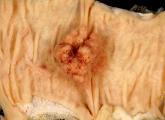Researchers identify cell pathway which plays a critical role in the development of colon cancer
Feb 20, 2007 - 7:09:32 AM
, Reviewed by: Dr. Rashmi Yadav
|
|
|
"The role of protein tyrosine phosphatase in cancer is still an under-explored area. Our study shows that receptor protein tyrosine phosphatase T regulates an important signaling pathway that is critical in cancer development. This identification will allow new approaches to pharmacological designs and facilitate alternative approaches for cancer treatment."
|
|
Key Points of this article
|
|
Researchers have identified STAT3 {signal transducer and activator of transcription 3}, as a target regulated by PTPRT {Receptor Protein tyrosine phosphatase T}, which was previously identified to be mutated in colon, lung and stomach cancer patients.
|
|
The finding that STAT3 is important for the growth of colon cancer is highly novel, and provides new impetus to the development of drugs that will target this molecule
|
|
|
|
By Case Western Reserve University,
[RxPG]
 |
| Most cancers begin as polyps%uE8B7 growth of tissue into the center of the colon or rectum and when typed as adenoma, can become cancerous. The mortality rates have been declining, this in part due to earlier screenings, awareness of symptoms, removing polyps and improved treatments through advances in research discoveries.
|
For the one in 18 men and women who will be diagnosed with cancer of the colon and rectum during their lifetime and over 150,000 people diagnosed on a yearly basis, todays genetic research news offers some optimism.
In a study to be published in the Proceedings of the National Academy of Sciences, {PNAS Online Edition Feb. 20-23, 2007} led by Zhenghe John Wang, Ph.D., Assistant Professor, Department of Genetics at Case Western Reserve University School of Medicine and Case Comprehensive Cancer Center, researchers have identified a cell pathway which plays a critical role in the development of colon cancer. This pathway may also play a role in the development of lung and stomach cancers.
Investigators say they have identified STAT3 {signal transducer and activator of transcription 3}, as a target regulated by PTPRT {Receptor Protein tyrosine phosphatase T}, which was previously identified to be mutated in colon, lung and stomach cancer patients.
"The role of protein tyrosine phosphatase in cancer is still an under-explored area. Our study shows that receptor protein tyrosine phosphatase T regulates an important signaling pathway that is critical in cancer development. This identification will allow new approaches to pharmacological designs and facilitate alternative approaches for cancer treatment? said Wang.
With over 52,000 deaths each year, colon and rectal cancer is the second leading cause of cancer death in the United States. Colon and rectal cancers begin in the digestive system and may start in a variety of different areas of the GI tract which take years to progress. Both colon and rectal cancer have many commonalities and for that are commonly referred as colorectal cancer? Most cancers begin as polypsa growth of tissue into the center of the colon or rectum and when typed as adenoma? can become cancerous. The mortality rates have been declining, this in part due to earlier screenings, awareness of symptoms, removing polyps and improved treatments through advances in research discoveries.
The finding that STAT3 is important for the growth of colon cancer is highly novel, and provides new impetus to the development of drugs that will target this molecule? said Dr. Sanford Markowitz, Ingalls Professor of Cancer Genetics at Case Western Reserve University School of Medicine and Investigator in The Howard Hughes Medical Institute, Case Medical Center.
The study also included collaboration with Bert Vogelstein, Victor Velculescu and Kenneth Kinzler of The Johns Hopkins Kimmel Cancer Center and a team led by Roberto Polakiewicz at Cell Signaling Technology Incorporation.
Advertise in this space for $10 per month.
Contact us today.
|
 |
|
Subscribe to Colon Newsletter
|
|
|
|
About Dr. Rashmi Yadav
|
This news story has been reviewed by Dr. Rashmi Yadav before its publication on RxPG News website. Dr. Rashmi Yadav, MBBS, is a senior editor for RxPG News. In her position she is responsible for managing special correspondents and the surgery section of the website. Her areas of special interest include cardiothoracic surgery and interventional radiology.
RxPG News is committed to promotion and implementation of Evidence Based Medical Journalism in all channels of mass media including internet.
|
|
Additional information about the news article
|
About Case Western Reserve University School of Medicine
Founded in 1843, Case Western Reserve University School of Medicine is the largest medical research institution in Ohio and 12th largest among the nations medical schools for research funding from the National Institutes of Health. Eleven Nobel Laureates have been affiliated with the school.
The School of Medicine is recognized throughout the international medical community for outstanding achievements in teaching and in 2002, became the third medical school in history to receive a pre-eminent review from the national body responsible for accrediting the nations academic medical institutions. The Schools innovative and pioneering Western Reserve2 curriculum interweaves four themes--research and scholarship, clinical mastery, leadership, and civic professionalism--to prepare students for the practice of evidence-based medicine in the rapidly changing health care environment of the 21st century.
Annually, the School of Medicine trains more than 600 M.D. and M.D./Ph.D. students and ranks in the top 25 among U.S. research-oriented medical schools as designated by U.S. News and World Report Guide to Graduate Education.
The School of Medicines primary clinical affiliate is University Hospitals Case Medical Center and is additionally affiliated with MetroHealth Medical Center, the Louis Stokes Cleveland Department of Veterans Affairs Medical Center, and the Cleveland Clinic Foundation, with which it established the Cleveland Clinic Lerner College of Medicine of Case Western Reserve University in 2002. http://casemed.case.edu
|
|
Feedback
|
For any corrections of factual information, to contact the editors or to send
any medical news or health news press releases, use
feedback form
|
Top of Page
|



